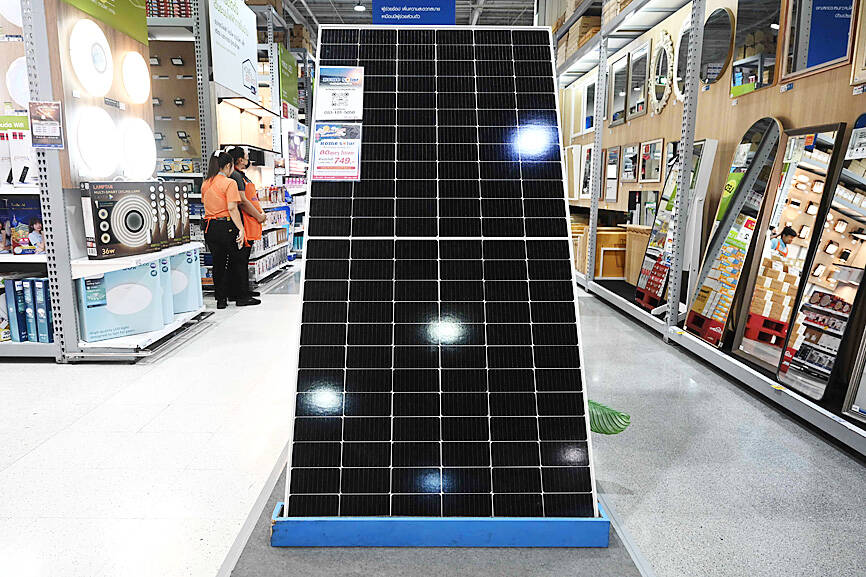The US on Monday announced its intention to impose tariffs of up to 3,521 percent on solar panels from Southeast Asia, a move aimed at countering alleged Chinese subsidies and dumping in the sector.
The tariffs on companies from Cambodia, Thailand, Malaysia and Vietnam would still need to be ratified at a meeting of the US International Trade Commission in June.
The decision unveiled comes after anti-dumping and countervailing duty (CVD) investigations were filed about a year ago by several US and other solar manufacturers.

Photo: AFP
The companies took aim at “unfair practices” that were said to have weighed on the US domestic solar market, particularly raising concern over Chinese-headquartered companies operating out of Southeast Asian countries.
While Monday’s move came after a year-long investigation, it follows on the heels of US President Donald Trump launching blistering trade wars through tariffs around the globe.
Trump’s tariffs, which have seen the White House impose high levies before suspending some of them to allow for negotiations, are aimed at reducing US trade imbalances.
However, the US Department of Commerce’s statement said the new recommended tariffs on solar cells were taking specific aim at “transnational subsidies.”
“In the CVD investigations involving Cambodia, Malaysia, Thailand and Vietnam, [the department] found that companies in each country were receiving subsidies from the government of China,” the statement said. “These are among the first CVD investigations wherein [the department] has made an affirmative finding that companies received transnational subsidies.”
The case was brought by Hanwha Qcells Co, First Solar Inc, Convalt Energy Inc and others.
For the duties to be finalized, the US International Trade Commission has until early June to make a final determination.
Among firms targeted were Chinese companies Jinko Solar Co (晶科能源) and Trina Solar Ltd (天合光能).
Products from Cambodia are set to face duties of up to 3,521 percent, the commerce department said.
Jinko Solar faced duties of 40 percent for exports from Malaysia and about 245 percent for goods from Vietnam.
Trina Solar in Thailand would see duties of more than 375 percent, and more than 200 percent for products from Vietnam.
If imposed, the new levies would come on top of the blanket 10 percent tariff imposed by Trump since early this month on products entering the US from most trading partners.
In 2023, the US imported US$11.9 billion in solar cells from the countries named in the latest action, official data showed.

Taiwan will prioritize the development of silicon photonics by taking advantage of its strength in the semiconductor industry to build another shield to protect the local economy, National Development Council (NDC) Minister Paul Liu (劉鏡清) said yesterday. Speaking at a meeting of the legislature’s Economics Committee, Liu said Taiwan already has the artificial intelligence (AI) industry as a shield, after the semiconductor industry, to safeguard the country, and is looking at new unique fields to build more economic shields. While Taiwan will further strengthen its existing shields, over the longer term, the country is determined to focus on such potential segments as

UNCERTAINTY: Innolux activated a stringent supply chain management mechanism, as it did during the COVID-19 pandemic, to ensure optimal inventory levels for customers Flat-panel display makers AUO Corp (友達) and Innolux Corp (群創) yesterday said that about 12 to 20 percent of their display business is at risk of potential US tariffs and that they would relocate production or shipment destinations to mitigate the levies’ effects. US tariffs would have a direct impact of US$200 million on AUO’s revenue, company chairman Paul Peng (彭雙浪) told reporters on the sidelines of the Touch Taiwan trade show in Taipei yesterday. That would make up about 12 percent of the company’s overall revenue. To cope with the tariff uncertainty, AUO plans to allocate its production to manufacturing facilities in

Chizuko Kimura has become the first female sushi chef in the world to win a Michelin star, fulfilling a promise she made to her dying husband to continue his legacy. The 54-year-old Japanese chef regained the Michelin star her late husband, Shunei Kimura, won three years ago for their Sushi Shunei restaurant in Paris. For Shunei Kimura, the star was a dream come true. However, the joy was short-lived. He died from cancer just three months later in June 2022. He was 65. The following year, the restaurant in the heart of Montmartre lost its star rating. Chizuko Kimura insisted that the new star is still down

While China’s leaders use their economic and political might to fight US President Donald Trump’s trade war “to the end,” its army of social media soldiers are embarking on a more humorous campaign online. Trump’s tariff blitz has seen Washington and Beijing impose eye-watering duties on imports from the other, fanning a standoff between the economic superpowers that has sparked global recession fears and sent markets into a tailspin. Trump says his policy is a response to years of being “ripped off” by other countries and aims to bring manufacturing to the US, forcing companies to employ US workers. However, China’s online warriors